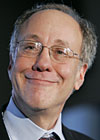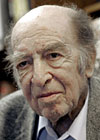3 Americans share Nobel in economics
Updated: 2007-10-16 09:21
STOCKHOLM -- Americans Leonid Hurwicz, Eric Maskin and Roger Myerson won the Nobel prize in economics on Monday for developing a theory that helps explain how incentives and private information affect the functioning of markets.
|
Roger Myerson |
Eric Maskin |
Leonid Hurwicz |
Hurwicz, 90, is the oldest Nobel winner ever, according to the academy. "I really didn't expect it," said the Moscow-born researcher, an emeritus economics professor at the University of Minnesota in Minneapolis.
The three winners "laid the foundations of mechanism design theory," which plays a central role in contemporary economics and political science, the Royal Swedish Academy of Sciences said.
Essentially, the three men, starting in 1960 with Hurwicz, studied how game theory can help determine the best, most efficient method for allocating resources, the academy said.
Their research has helped explain decision-making procedures involved in economic transactions including, for example, what insurance polices will provide the best coverage without inviting misuse.
It has been used in everything from negotiations over labor issues to the auctioning of government bonds and has helped countries and companies better understand how markets function even when conditions are rocky.
Hurwicz told reporters he was surprised to have won the award.
"There were times when other people said I was on the short list, but as time passed and nothing happened I didn't expect the recognition would come because people who were familiar with my work were slowly dying off," he said.
Maskin, 56, is professor at the Institute for Advanced Study at Princeton, New Jersey; and Myerson, 56, is a professor at the University of Chicago in Illinois.
Maskin said he was relieved Hurwicz was among the winners.
"Many of us had hoped for many years that he would win," Maskin told reporters in Stockholm in a conference call. "He is 90 years old now, and we thought time was running out. It is a tremendous honor to have the opportunity to share the prize with him and with Roger Myerson."
The academy said the researchers' theory let economists, governments and businesses "distinguish situations in which markets work well from those in which they do not."
Myerson told Sweden's TV4 network: "It is a huge honor, I'm just overwhelmed to have my name on that list,"
He told The Associated Press that being named a Nobel winner was "a great privilege" and that he was inspired by the work of his fellow laureates.
"There were a lot of us working in this area in the late 1970s," Myerson said, categorizing his work as investigating "How does information get used in society to allocate resources."
In its citation, the academy said that the work done by Hurwicz, Maskin and Myerson has let us "distinguish situations in which markets work well from those in which they do not." This, it added, helped economists identify efficient trading mechanisms, regulation schemes and voting procedures.
Myerson explored the concept in detail in his work, "Game Theory: Analysis of Conflict," and even built a mathematical model that analyzed elections.
Maskin, meanwhile, was cited for his work on determining what kinds of auctions, or selling procedures, could bring in the most revenue to sellers.
The prize is officially known as the Nobel Memorial Prize in Economic Sciences.
The economics award is not one of the original Nobel Prizes. It was created in 1968 by the Swedish central bank in Nobel's memory.
Americans have dominated the economics prize in recent years. The last non-American to win the prize was Canada's Robert Mundell in 1999.
Last year American Edmund Phelps won the prize for explaining the relationship between inflation and unemployment, work that has had a profound impact on macroeconomic policy.
Nobel Prize winners receive $1.5 million, a gold medal and a diploma from the Swedish king on December 10, the anniversary of Nobel's death in 1896.
The other prizes were announced last week, with the Nobel Prize in medicine going to Americans Mario R. Capecchi and Oliver Smithies, and Briton Sir Martin J. Evans, for groundbreaking discoveries that led to a powerful technique for manipulating mouse genes.
France's Albert Fert and German Peter Gruenberg won the physics award for discovering a phenomenon that enables computers and digital music players to store reams of data on ever-shrinking hard disks.
Gerhard Ertl of Germany won the chemistry prize for studies of chemical reactions on solid surfaces, which are key to understanding questions such as why the ozone layer is thinning.
Britain's Doris Lessing won the literature prize, and former US Vice President Al Gore and the UN's Intergovernmental Panel on Climate Change won the 2007 Nobel Peace Prize for their efforts to spread awareness of man-made climate change.
|
|
|
||
|
||
|
|
|
|


